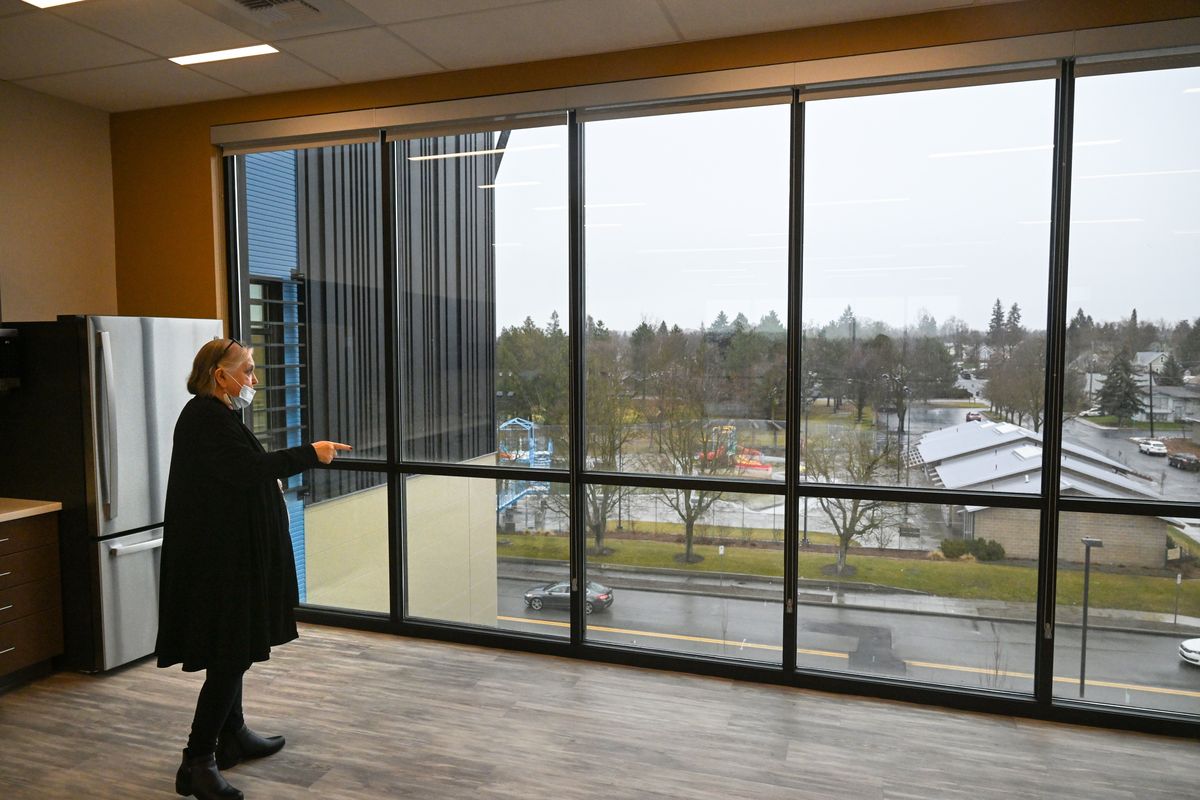‘Every neighborhood should have one of these’: The NATIVE Project to open new Children and Youth Services Center next month

Standing tall in Spokane’s West Central Neighborhood, the NATIVE Project’s new Children and Youth Services Center is expected to open its doors to patients by the end of February.
With Indigenous themes woven throughout the interior and an unmistakable curving exterior designed by Womer and Associates, the center is an expansion of the existing Native American Treatment Intervention Education Project’s community health clinic, located just across the street.
A nonprofit with more than three decades of history in Spokane, the NATIVE Project is an Urban Indian Health and qualified federal clinic. The organization offers medical, dental, pharmaceutical and behavioral care, with an orientation towards Black, Indigenous and people of color. It began 35 years ago with programs to get local kids to care about community issues like drugs, alcohol and violence.
“That’s our intention – to be really, really good at what we do to communities that don’t usually get a lot of attention,” said the project’s CEO, Toni Lodge. “But now with the four-story building, not the lobbying action.”
Though programs at the clinic are structured to support people of color, “we take everybody regardless of ability to pay. Regardless of insurance status,” NATIVE Project CFO Ken Stewart said, adding that they offer assistance with setting up insurance and tribal documentation.
Lodge said the clinic has been aiming to improve the West Central Neighborhood through buying rundown city lots and transforming them into service centers, like the new children’s center.
“We’re actually investing in West Central, because this is really a community of color – a neighborhood of color – but it’s also a poor community, obviously,” Lodge said. “So we’ve just been investing here, trying to make a campus of services for people.”
Having children’s and youth services readily available is vital for addressing local homelessness and drug abuse issues, Lodge said.
“Every neighborhood should have one of these for children,” Lodge said. “I mean, this is licensed mental health (care). This is licensed substance use disorder treatment. This is prevention. This is culture.”
Culture and community connection are key pieces of preventive treatment the NATIVE Project takes on, Stewart said.
“It has everything to do with heath care. If you’re not connected to your community, you’re far more likely to be watching TV, eating potato chips. If you’re not connected to these programs, you’re more likely to start using drugs,” Stewart said. “It’s a lot of work that people have been doing for thousands of years, but we’ve forgotten how to do them, and so now we’re trying to do it again.”
The construction was fully funded for more than $11 million through grants from the city of Spokane, Indian Health Services, donors and fundraising efforts, Lodge said. Construction began on the site last October.
IHS federal law had to be changed to allow them to receive a construction grant, Stewart said, making the youth center the first urban Indian clinic in the country to receive IHS money for construction.
Lodge, who is a member of the Turtle Mountain Chippewa Tribe, said the building is a symbol of the positive impact that Indigenous people have on Spokane communities.
“People don’t – when they think of Natives, they don’t think of part of the solution. They don’t think of how really, really vibrant we are in terms of a community, you know, building an $11 million building, how much revenue that put into the economy of Spokane. How much value added that is to West Central,” she said. “We want to switch it up and say: We can build a beautiful building for children.”
The building features floors themed after native animals, full kitchens, employee showers and Indigenous symbols.
Immediately upon entering the center, a handmade Kalispel canoe is on display to symbolize a “journey,” Lodge said. On the other side of the display is a round room named for the late Francis Cullooyah, who was a member of the organization from its inception to his death in September.
“When they’re in there doing ceremony, when they’re doing culture, they’re going to be able to see the symbol of the journey,” she said. “It’s just beautiful, and it’s for him.”
Outside of one-on-one health care, the NATIVE Project holds a number of community health events, including a Healthy Heart Powwow and weekly community wellness nights at Spokane Montessori School involving a variety of family-friendly activities.
Lodge has big plans for the future of the NATIVE Project, including creating a larger parking lot and medicinal garden growing tobacco and sweetgrass in the space where The Ugly Duck Warehouse used to be located.
“Really, undoing the genocide – that’s my motive,” Lodge said. “Live longer, undo the genocide, make life better for my 10 grandkids and all the other kids.”